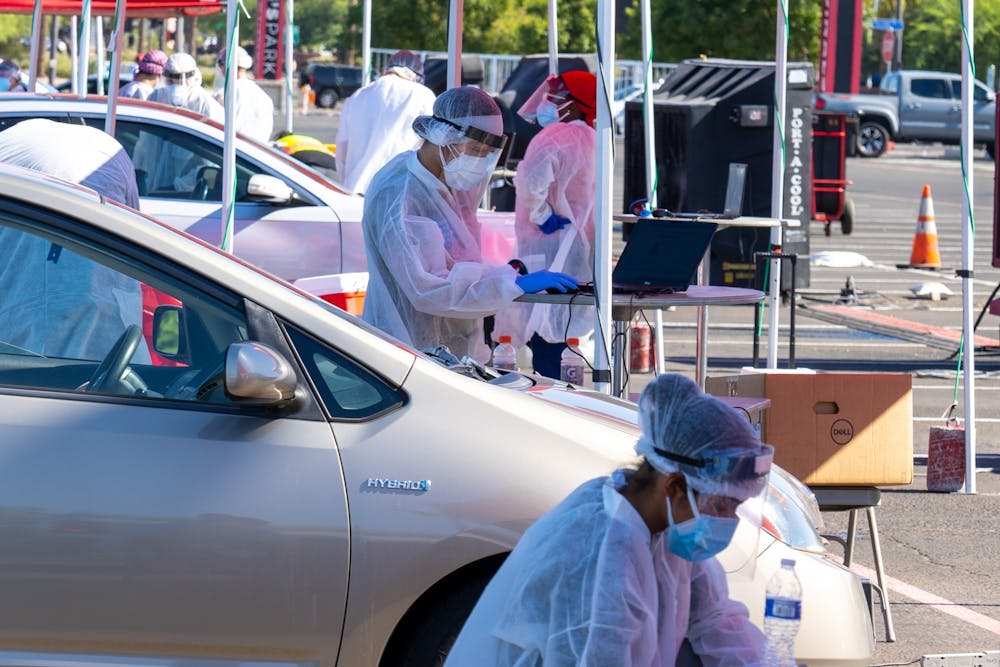Days before classes even begin, ASU is reporting four times as many active cases of the coronavirus as it was at the start of last semester when Arizona was reporting far fewer newly reported daily cases.
On Thursday, the University reported 681 active COVID-19 cases within the school community — 528 of the infections are among students and 153 are among employees. Throughout winter break and since Thanksgiving, the number of active cases has only increased.
Of the active student cases within the ASU community, 497 are off campus in the metropolitan Phoenix area, 27 are isolating on the Tempe campus and the remaining four are on either the Downtown Phoenix, Polytechnic or West campuses.
As students finished finals, the University reported on Dec. 3 the cumulative total number of infections among students and employees was 3,357. On Thursday, the University reported a cumulative total of 4,854.
On Aug. 20, the day the fall semester started, Arizona reported 723 new cases of COVID-19, according to data from the COVID Tracking Project. The Arizona Department of Health Services reported Saturday there had been 11,094 new cases and 98 additional deaths, bringing state totals to 607,345 cases and 10,036 deaths.
The start of last semester led to a spike in active infections within the ASU community, University officials have said.
ASU is starting the spring semester in the same learning and housing modes in which fall semester ended: Instruction can be delivered in-person, through ASU Sync or iCourses and students can still live in University housing where no external visitors can enter and communal spaces will be monitored, despite data from the Centers for Disease Control and Prevention showing Arizona has the highest rate of new COVID-19 cases in the country.
Recent case surges have been linked to in-person winter holiday gatherings at Thanksgiving, Christmas and New Year’s Eve.
A report from the CDC released Friday said counties with large college campuses operating with in-person instruction had a 56% increase in infection incidence after reopening for their fall semesters.
“Efforts to prevent and mitigate COVID-19 transmission are critical for U.S. colleges and universities,” the report said. “Congregate living settings at colleges and universities were linked to transmissions.”
The report also said testing students before they return to campus and throughout the semester “might be an effective strategy to rapidly identify and isolate new cases to interrupt and reduce further transmissions.”
Joshua LaBaer, executive director of the Biodesign Institute, said in a press briefing Wednesday the University will continue testing students and employees randomly as well as requiring a negative test before students move in.
LaBaer, who is teaching classes in the biochemistry of cancer and other biological design research, is doing so virtually.
“I would like to move back into the classroom obviously because a lot of my course involves discussion,” LaBaer said. “But at the beginning, right now, I think it’s safer to stay virtual.”
LaBaer also said Wednesday hospital capacity across the Valley is “primarily managing patients with COVID-19,” not admitting or prioritizing patients who would typically be admitted for emergencies or other illnesses.
COVID-19 tests conducted by ASU testing facilities have observed genes that could potentially be the B.1.1.7 strain of the virus most recently seen in an outbreak across the United Kingdom, LaBaer said. Labs at the Biodesign Institute are working to confirm any presence of the strain.
READ MORE: Analyzing ASU’s COVID-19 trends throughout the fall semester
The University has repeatedly said it will continue to give students more opportunities to pursue in-person activities, including classes that could be, and have been, delivered remotely. ASU will encourage faculty to teach in person who will be required to receive approval before changing the mode of their class from ASU Sync, a blend of in-person instruction and Zoom, to Zoom only.
In a Friday email to ASU students and employees, University President Michael Crow wrote, “I know we all wish we could just ‘be done’ with this virus. But, as I’ve shared before, COVID-19 is not going away.”
The email also announced faculty teaching in the classroom during the upcoming semester will be included in Phase 1B of the state’s vaccine distribution plan.
Reach the reporter at pjhanse1@asu.edu and follow @piperjhansen on Twitter.
Like The State Press on Facebook and follow @statepress on Twitter.
Continue supporting student journalism and donate to The State Press today.

Piper Hansen is the digital editor-in-chief at The State Press, overseeing all digital content. Joining SP in Spring 2020, she has covered student government, housing and COVID-19. She has previously written about state politics for The Arizona Republic and the Arizona Capitol Times and covers social justice for Cronkite News.




